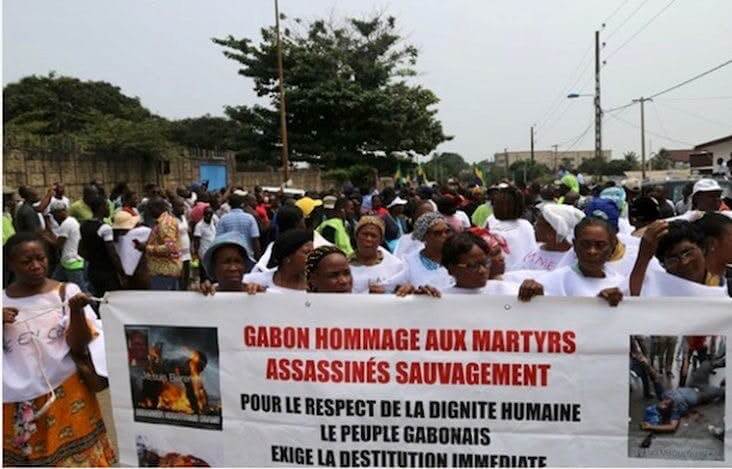Human Rights Foundation (HRF) condemns the Gabonese government’s crackdown on activists and union leaders, and calls for their immediate release. In recent weeks, more than 30 civil society leaders were arrested and imprisoned for organizing demonstrations in opposition to president Ali Bongo Ondimba, who is seeking a second term in the upcoming August election. On July 9, during a peaceful demonstration held in a private area, 26 activists, including union leaders, were arrested after the police disbanded the protesters with tear gas. All 26 activists are still being held in pre-trial detention for “inciting violence and harming public order.” On July 16, security forces disrupted a similar demonstration and arrested a group of youth activists. They were charged with “harming public order” and later released on bail. Some of them were reportedly coerced into making false confessions.
“The Gabonese people are fed up with living under a dictator who runs the country like his private property, squandering and looting its wealth while 70 percent of the population live in poverty, deprived of running water and their most fundamental rights,” said Thor Halvorssen, president of HRF. “Civil society in Gabon is fighting to bring about change, but Bongo’s authoritarian regime has been brutally cracking down on its efforts, with the intent to suppress any meaningful competition for power,” added Halvorssen.
Although Gabonese law permits public demonstrations, Ali Bongo Ondimba has made it impossible for civil society to assemble without being violently dispersed by the authorities.
The judicial persecution of activists has risen in the past week. On July 23, the police threw tear gas and fired shots at hundreds of Gabonese people who were peacefully protesting against Bongo’s candidacy for re-election, accusing him of using a forged birth certificate. Several have been injured, including a cameraman from AFP who was beaten by security forces.
“The incitement charges faced by the Gabonese demonstrators are commonly used by authoritarian regimes around the world to stifle legitimate criticism. Laws criminalizing incitement are typically vague and overly broad, so that authoritarian regimes can easily use them to silence political dissenters,” said Celine Assaf Boustani, international legal associate at HRF. “These laws violate the international standard on freedom of expression under the International Covenant on Civil and Political Rights (ICCPR), of which Gabon is a signatory and is therefore legally obligated to adhere to,” added Assaf Boustani.
HRF has partnered with Brainforest, a Gabonese human rights organization, to develop human rights guides tailored to educate the Gabonese people on their basic individual rights under international law. The guides will be disseminated online and in print form.
